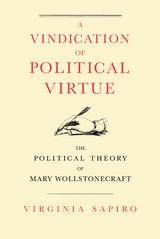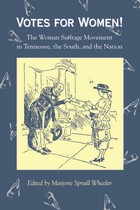4 start with V start with V

Kells draws on Ximenes’s extensive archive of speeches, reports, articles, and oral interviews to present the activist’s rhetorical history. After a discussion of Ximenes’s early life, the author focuses on his career as an activist, examining Ximenes’s leadership in several key civil rights events, including the historic 1967 White House Cabinet Committee Hearings on Mexican American Affairs. Also highlighted is his role in advancing Mexican Americans and Latinos from social marginalization to greater representation in national politics.
This book shows us a remarkable man who dedicated the majority of his life to public service, using rhetoric to mobilize activists for change to secure civil rights advances for his fellow Mexican Americans.

Drawing on all of Wollstonecraft's works and treating them thematically rather than sequentially, Sapiro shows that Wollstonecraft's ideas about women's rights, feminism, and gender are elements of a broad and fully developed philosophy, one with significant implications for contemporary democratic and liberal theory. The issues raised speak to many current debates in theory, including those surrounding interpretation of the history of feminism, the relationship between liberalism and republicanism in the development of political philosophy, and the debate over the canon. For political scientists, most of whom know little about Wollstonecraft's thought, Sapiro's book is an excellent, nuanced introduction which will cause a reconsideration of her work and her significance both for her time and for today's concerns. For feminist scholars, Sapiro's book offers a rounded and unconventional analysis of Wollstonecraft's thought.
Written with considerable charm and verve, this book will be the starting point for understanding this important writer for years to come.

His friends and associates knew that Oregon Supreme Court Justice Hans Linde convinced Schuman to turn to the Oregon Constitution rather than the federal one to protect individual rights. But even some of Schuman’s closest friends were unaware of his fiction, which provides a window into his deep capacity for empathy and casts new light on his ability to write elegant, sometimes funny, judicial opinions. His legal thinking also had deep roots in literature and political theory.
Schuman’s 672 judicial opinions are not just brilliant, but written so that anyone can understand them. Like Ruth Bader Ginsburg, he knew there was nothing to gain by communicating only to specialists. He wanted citizens to be able to make up their own minds about important issues.
A Voice for Justice brings together for the first time writings that span over fifty years. Lawyers and laypeople alike will appreciate Schuman’s lucid, engaging observations, which are highly relevant to our current anxieties about institutional racism and democracy under stress. The short stories, speeches, op-eds, articles, legal opinions, and dissents selected for this volume constitute a call to action for everyone to become voices for justice.

A unique collection of scholarly essays and primary documents, Votes for Women! brings into sharp focus the suffrage battles of the late nineteenth and early twentieth centuries. Not only does the book examine the struggle at the national level but it looks in depth at how the drama played out in the South and in Tennessee, which in 1920 became the pivotal thirty-sixth state to ratify the Nineteenth Amendment—thereby making woman suffrage the law of the land.
The volume contains six essays by leading scholars on topics ranging from the strategies suffragists used to raise the national consciousness to the participation of African-American women in the movement. Also included are discussions of anti-suffragist beliefs and literature, the obstacles to woman suffrage in the South posed by white supremacy and state’s rights, and the ways in which women have used their political power since receiving the vote.
A special feature of the book is its compilation of primary materials—articles, speeches, cartoons, and broadsides—representing the viewpoints of suffragists and anti suffragists alike. Among these documents are the previously unpublished memoirs of the Tennessee anti-suffrage leader Josephine Anderson Pearson and a chapter on Tennessee from the 1923 book by Carrie Chapman Catt and Nettie Roger Shuler, Woman Suffrage and Politics, which contains a fascinating firsthand account of the final, no-holds-barred battle over woman suffrage in Nashville during the summer of 1920.
Published to coincide with the seventy-fifth anniversary of the suffragists’ victory, this book, at once stirring and thoughtful, commemorates the courage of those involved in the suffrage movement and recaptures the intensity of emotions and ideology on both sides.
READERS
Browse our collection.
PUBLISHERS
See BiblioVault's publisher services.
STUDENT SERVICES
Files for college accessibility offices.
UChicago Accessibility Resources
home | accessibility | search | about | contact us
BiblioVault ® 2001 - 2024
The University of Chicago Press









